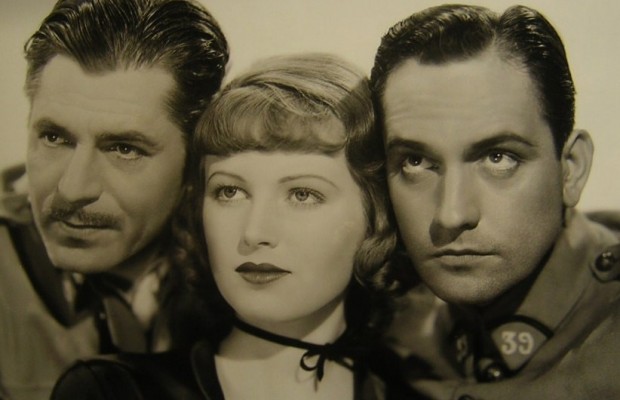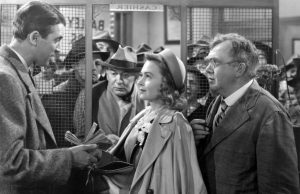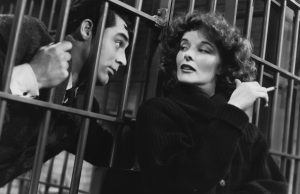The Road to Glory (1936)
By Toronto Film Society on October 18, 2014
Toronto Film Society presented The Road to Glory (1936) on Monday, December 16, 1974 in a double bill with What Price Hollywood? as part of the Season 27 Monday Evening Film Buff Series, Programme 2.
Production Company: Twentieth Century-Fox. Director: Howard Hawks. Producer: Darryl F. Zanuck. Script: Joel Sayre, William Faulkner, after the French film Les Croix de Bois [Wooden Crosses] directed by Raymond Bernard, which in turn was drawn from the novel by Roland Dorgelès. Photography: Gregg Toland. Editor: Thomas Little. Assistant Director: Ed O’Fearna [John Ford’s brother].
Cast: Fredric March (Lieutenant Michel Denet), Warner Baxter (Captain Paul Laroche), Lionel Barrymore (Papa Laroche), June Lang (Monique), Gregory Ratoff (Boufiou), Victor Kilian (Regnier), Paul Stanton (Relief Captain), John Qualen (Duflous), Julius Tannen (Lieutenant Tannen), Theodore von Eltz (Major), Paul Fix (Rigaud), Leonid Kinskey (Ledoux), Jacques Lory (Courier), Jacques Vernaire (Doctor), Edythe Taynore (Nurse), George Warrington (Old Soldier).
Howard Hawks (b. May 30, 1896), the most typically ‘American’ of all film directors, has made films in many genres, with his pictures being in many cases among the leading examples of the genre. His comedies, particularly His Girl Friday (1940), Twentieth Century (1934) and Bringing Up Baby (1938), are as fresh and wacky today as when originally made. Red River (1948), Rio Bravo (1959) and The Big Sky (1952) are the only Westerns that come close to the John Ford masterworks in lyricism, magnitude and emotion. Scarface (1932) is possibly the best gangster picture ever made, and The Big Sleep (1946) approaches it in the film noir genre. Only Angels Have Wings (1939), Ceiling Zero (1936) and The Crowd Roars (1932) are excellent adventure films, fulfilling Hawks’ theory that the best kind of drama is that in which a man is in danger, with life or death in the balance. And the war films, The Dawn Patrol (1930), Air Force (1943), The Road to Glory and Sergeant York (1941) combine this thrill of danger with another favourite Hawks motif, that of the interaction of men in a group. Considering this impressive filmography–with most of his sound films being extremely profitable financially–it is amazing to realize that Hawks has never won a Best Director award from either the Academy Awards or the New York Film Critics, and has only been nominated once, as I recall, for an Oscar, for Sergeant York.
Hawk’ style, both narratively and cinematically, is perhaps the least stylized or pretentious of any great director, with the possible exception of Buster Keaton. Lighting, camerawork, dramatic time and acting are ultra-professional, though never slick; moreover, they are always at the service of the storytelling. It is in this storytelling–blended with penetrating characterizations–that Hawks has no peer. The Road to Glory, a tale concerning a doomed French regiment in WWI, is a slight departure from the norm for Hawks. The mixture of anti-war propaganda with glories of regimental tradition are ingredients more familiar and peculiar to Ford [Pilgrimage (1933), They Were Expendable (1945), the Civil War segment of How the West Was Won (1963) and many of Ford`s Westerns, than Hawks.
Warner Baxter (March 29, 1891 – May 7, 1951) had a thirty-year film career but was only in vogue for about eight years, from In Old Arizona (1929) [he won the best actor Academy Award] to tonight’s film. In many of the films that came in between [Surrender (1931–in a role and performance akin to his part in tonight’s film), Six Hours to Live (1933), Forty-Second Street (1933), Robin Hood of Eldorado (1935) and The Prisoner of Shark Island (1936)] Baxter exhibited a unique quality of world-weary fatigue and calm, moody fatalism.
Notes by Jaan Salk
You may also like...
-
News

Frances Blau
Toronto Film Society | February 27, 2024On Monday, February 26th, 2024, Toronto Film Society lost longtime friend, supporter, and board member Frances Blau. Known for her sense of humour, her love of film, her generosity,...
-
Special Events

The Ladykillers (1955) at the Paradise Theatre
Toronto Film Society | March 9, 2024Toronto Film Society presents Targets (1968) at the Paradise Theatre on Sunday, April 7, 2024 at 2:30 p.m. Ealing Studios arguably reached its peak with this wonderfully hilarious and...
Programming

Virtual Saturday Night at the Movies
Toronto Film Society | April 11, 2024Toronto Film Society is back in the theatre! However, we’re still pleased to continue to bring you films straight to your home! Beginning Season 73 until now we have...
4-
 Toronto Film Society | March 9, 2024
Toronto Film Society | March 9, 2024
-
 Toronto Film Society | November 6, 2022
Toronto Film Society | November 6, 2022
-
 Toronto Film Society | August 1, 2023
Toronto Film Society | August 1, 2023
Donate to Toronto Film Society – We’re now a Registered Charity!
-
Copyright © 2017 Toronto Film Society.







Leave a Reply